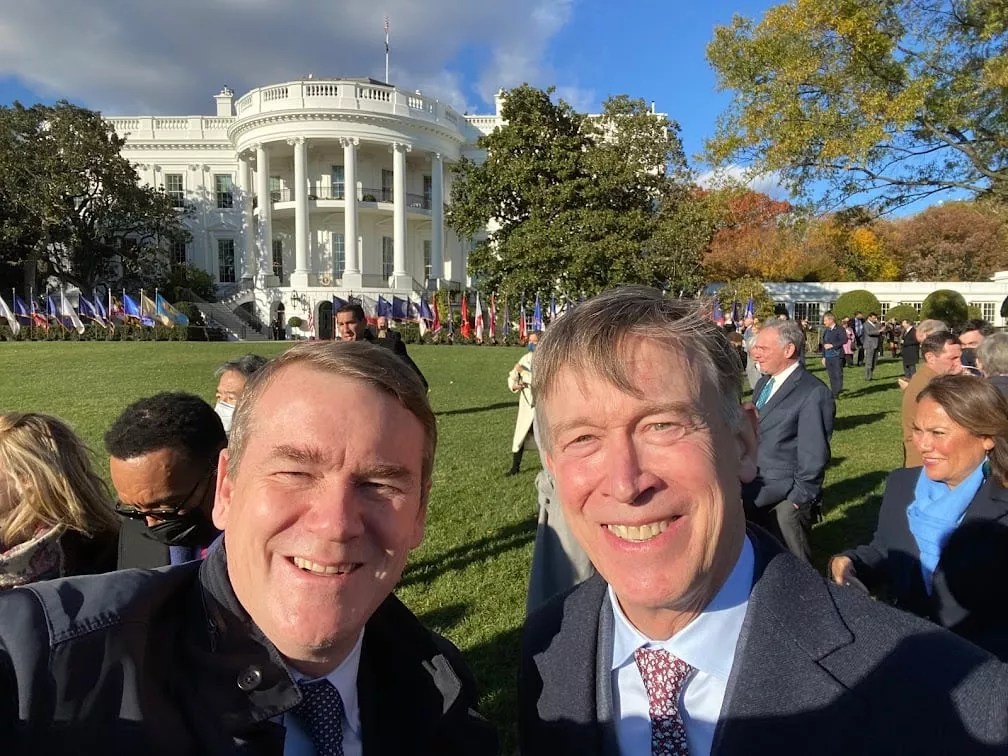
Senator Michael Bennet Facebook

Audio By Carbonatix
Colorado senators Michael Bennet and John Hickenlooper have signed a joint letter urging congressional leaders to consider federal legislation allowing marijuana businesses to access banking services.
Bennet and John Hickenlooper asked ranking members of Senate committees currently considering the National Defense Authorization Act, a required funding bill for federal law enforcement, to include the Secure and Fair Enforcement (SAFE) Banking Act’s language in the broader defense bill.
“Current law prevents licensed marijuana businesses from accessing banking services and products -such as depository and checking accounts – resulting in businesses operating all in cash,” reads the November 24 letter. “Without federally-approved banking services, state-licensed cannabis businesses cannot write checks, make or receive electronic payments, utilize a payroll provider, or accept credit and debit cards.”
Initially introduced by Representative Ed Perlmutter, the SAFE Banking Act would allow banks to offer state-legal pot business loans, lines of credit, checking accounts and other traditional financial services. The bill has passed the House a handful of times as stand-alone legislation or as an amendment to other budget bills since 2019, including the recently passed House version of the NDAA – but a larger push for federal legalization and social reparations from the drug war have moved the SAFE Banking Act to the sidelines in the Senate.
Because of the plant’s federal prohibition, marijuana businesses are banned from financial services and tax deductions, and any institutions that serve those businesses are technically at risk of federal drug charges. Although some smaller banks and credit unions will take on that risk for high fees, the majority of legal marijuana transactions are still done in cash, creating a target for crime, according to Bennet and Hickenlooper.
“This is a serious public safety risk for our communities, inviting theft, tax evasion, robberies, burglaries, or worse,” the Colorado senators state, adding that operating in cash “further disadvantages the cannabis industry by making it difficult to obtain loans at reasonable rates.”
According to an annual marijuana impact report compiled by the Denver Department of Excise and Licenses, burglaries associated with commercial marijuana rose from 122 in 2019 to 175 in 2020. Despite accounting for under 1 percent of all businesses in Denver, marijuana businesses accounted for 8.6 percent of all reported business burglaries in 2020, the department noted. And LivWell Enlightened Health, one of Colorado’s largest marijuana businesses, experienced fifteen burglary attempts over a three-month span last year, one manager there reported.
Democratic senators Cory Booker and Majority Leader Chuck Schumer, who’ve been pushing forms of more aggressive pot legislation with social equity provisions, have suggested that if marijuana banking were approved, it could compromise the national legalization effort by putting one foot in with commerce but keeping the other foot out with social justice. In their letter, Bennet and Hickenlooper argue the opposite.
“The legalization of cannabis has created entrepreneurship opportunities out of formerly illicit markets, but a lack of access to capital limits the ability of would-be entrepreneurs and small business owners to enter this emerging industry,” their letter reads.
Governor Jared Polis was part of a bigger push for the SAFE Banking Act earlier in November, joining 23 other governors who signed a letter asking senators to add the bill as an amendment to the NDAA. The Colorado politicians aren’t alone in asking for the SAFE Banking Act’s passage, but the bill still hasn’t received a vote in the Senate.
However, Hickenlooper, who was Colorado governor during the first years of recreational legalization, had some marijuana-related success with the Infrastructure Investment and Jobs Act, in which he secured an amendment that requires the United States Department of Transportation to study how marijuana impairs driving and push federal marijuana research that better reflects products found in today’s legal markets. That bill was signed by President Joe Biden on November 15.
The NDAA’s next hearing will be Tuesday, November 30, with the Senate Banking, Housing, and Urban Affairs Committee. Find Bennet and Hickenlooper’s full letter below.